

The National Association of Pension Funds has urged the government to help defined benefit schemes deal with their larger deficits due to a prolonged period of low interest rates.
NAPF’s DB policy lead Helen Forrest said the government should ensure a suitable supply of inflation-linked investments for DB schemes, to help them shore up their funding gaps.
Ms Forrest added: “These market conditions increase the appetite of funds for assets that match the scheme’s long-term, inflation-linked liabilities.
“It is critical the government supports pension funds by ensuring a suitable supply of such assets, including the provision of a pipeline of infrastructure projects with a risk profile that makes them an attractive investment opportunity for pension funds.”
Her comments came in response to the annual funding statement released by The Pensions Regulator last week, which acknowledged that many schemes were likely to experience larger deficits in 2015 than at their last triennial valuation, due to changing market conditions.
Stephen Soper, executive director for DB at TPR, said: “Persistent low interest rates and falling gilt yields means that it remains a very challenging environment for DB schemes with 2015 valuation dates.”
The statement also said that schemes with the capacity to take additional risks should be able to address higher deficits through appropriate changes to their funding strategies.
Adviser view
Tim Page, director at Surrey-based financial planners Page Russell said: “The NAPF is again frantically waving a flag to the government to alert it that they can kill two birds with one stone. Investing in infrastructure is a great way to solve pension funds’ low yield problem and help upgrade the country’s crumbling infrastructure, which would also help reduce the productivity gap.”
Background
In March the FCA increased its annual funding requirement for the financial year 2015/16 by £35m to £481.6m. In May, Mas announced a £4m year-on-year increase in funding to provide its guidance.


